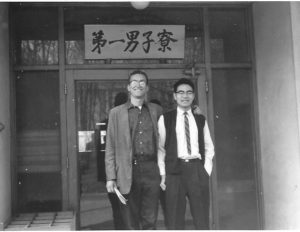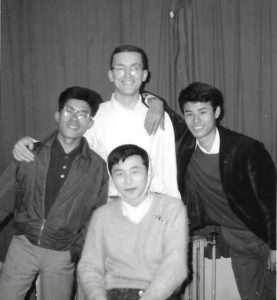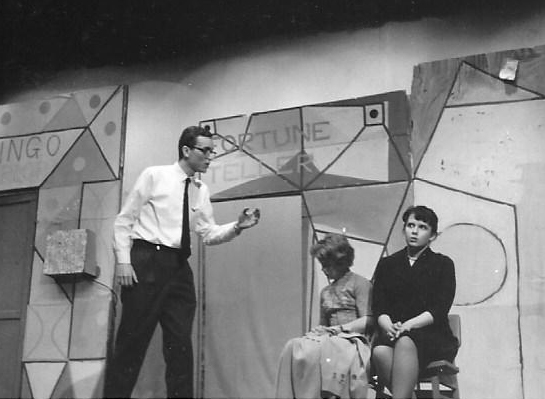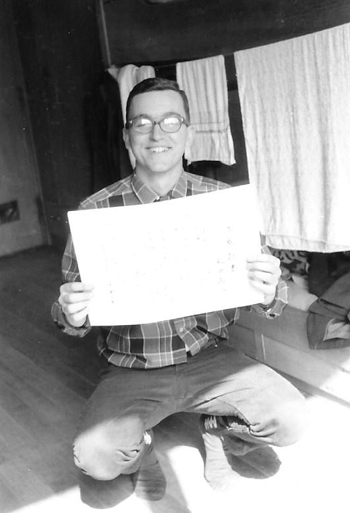Alumni Stories No.19 Tim Winant – Part 2
This is part two of alum Tim Winant’s story. Tim studied abroad at ICU as an “OYR” (“One Year Regular” or exchange student) in 1962 and as a special student in 1965. In the 1980s, he was on the Board of JICUF, and returned to ICU in 1990 to serve as the Assistant to the President and the Dean of International Affairs until 1999. You can read part 1 here.

Dormitory and Campus Life
There are a number of ways to learn and experience more about Japan. A popular one with arriving international students is the home stay. The assumption is that by residing with a Japanese family, hopefully one with two parents and one or more children, it will be possible to get deeply into the realities of Japanese life. For independent student types, an off-campus apartment is a preferred alternative. The freedom to come and go, something that is not always possible while living with a family, is a comforting thought to those who are already used to being on their own in their home countries. One of the most interesting and useful experiences I had while a student at ICU, however, was to be able to live in a student dormitory. It was also, for me, unique, because not only did I live in an ICU dormitory when I was an undergraduate, one-year regular, student, but also two years later as a graduate, a special student. That gave me two rather different perspectives on ICU, and also on life among Japanese students at the university.
There were things to get used to when living in a dormitory, especially one so different from the experience at an American university. I was assigned to the First Men’s Dormitory, the oldest of the men’s dormitories which, unfortunately, no longer stands on the campus. Compared to the other dorms at ICU, First Men’s Dormitory, Jupiter House, was more communal, as it had four person rooms. Residents of the dormitory had a variety of duties and obligations that I had not previously experienced. For example, there was telephone duty and dormitory cleaning obligations. But the opportunity to participate in the lives and experiences that Japanese students shared with one another was a priceless learning time. Adjusting proved remarkably simple because I had been prepared to suspend judgment, and understood from the beginning that differences were to be expected, and that it was important for me to embrace the new and different, and to expect the unexpected.

The First Men’s Dormitory, Jupiter House, was well- organized, had an elected leadership, and well-defined activities that were all inclusive for students in each class, and for the scattering of international students. My first assignment was to the only two-person room, on the second floor next to the storage room. As my roommate was a chemistry major with an active off campus social life, we rarely saw each other, thus allowing me to get to know the other students on my own, and their efforts to reach out to me were most welcome.
Dorm duties like telephone duty allowed me to work on my Japanese language skills, as virtually every incoming call had someone speaking Japanese on the other end. Understanding who they wanted to talk to, required understanding a range of polite and colloquial expressions. I got to know all the students because I often had to rush up to their rooms to alert them to a phone call for them. Cleaning duty for common areas of the dorm was also new. I learned that Japanese students were used to this kind of responsibility because it is common at all levels of school. Social Room, hallways, and bath cleaning was a cooperative activity with all roommates involved.
The annual Dormitory Festival was an opportunity to have visitors who normally would not be able to see the living experiences of students, and injected excitement that gave even more group efforts for students to know each other better. Inter-dormitory competitions, sports, and student club activities also offered rewarding moments as well. All in all, the dormitory experience was one that helped create friendships that endure to this day, sixty years later.
During my first year at ICU, I participated in all the dormitory activities, of course, but I also was able to join an unique experience when Ann Cook Reid, the wife of visiting Professor Ira Reid from Haverford College, directed performances of the Thornton Wilder play, ‘The Skin of Our Teeth’. A truly international cast, it also included several faculty members, most notably Professor Kidder. I was not a principal player, but I had three different parts, one in each act. Another highlight was a group visit to Korea that was planned by several of us who were taking the courses offered by Professor Soon Sung Cho. As Japan and Korea had not yet established normal diplomatic relations after WWII, that required much negotiation. The ICU group was the first group of students from a Japanese university to visit Korea after 1945, and we got a lot of attention in Korea, even meeting with the Prime Minister. Our hosts were Yonsei University, and our group all enjoyed home stays in both Busan and Seoul.

After my first year at ICU I realized that I had not been able to develop enough aptitude in the Japanese language, so I resolved to return for another year after completing my undergraduate studies. As it turns out, it was to be two years before I was able to return. This time I was going to be a Special Student participating in the Intensive Japanese Language Program (JLP). I assumed that this time I would be obligated to live off campus as there was no provision for graduates to live on campus at that time. I was very surprised, therefore, when I received a letter from the university housing office asking me to consider living once again on campus. Of course, that was an easy decision to make, so I immediately agreed. It was not until I arrived on campus and was invited into the apartment of the faculty advisor to the First Men’s Dormitory, Professor Oguchi, that I learned that despite the rules, the students I had lived with during my first time at ICU had requested that I be once again assigned to the dorm. Quite extraordinary, but very welcome. The First Men’s Dormitory was my home on the ICU campus.

One of the most valuable experiences for me was the ample opportunities afforded by visits with ICU’s faculty members who lived with their families on campus. Almost every week one or another faculty home was open for students to visit and enjoy the hospitality of the faculty. I became close to several faculty, including the Troyers, Chos, Reids and Kidders who lived on campus, and the Inomatas who were off campus. An unique period in my educational and personal life, ICU became a significant influence on my future studies and professional life. Life long commitment to the ideal of the university, long and close friendships, and enduring memories, all a result of the ICU experience.
This is part 2 of a four-part series. To read part 3, click here.



